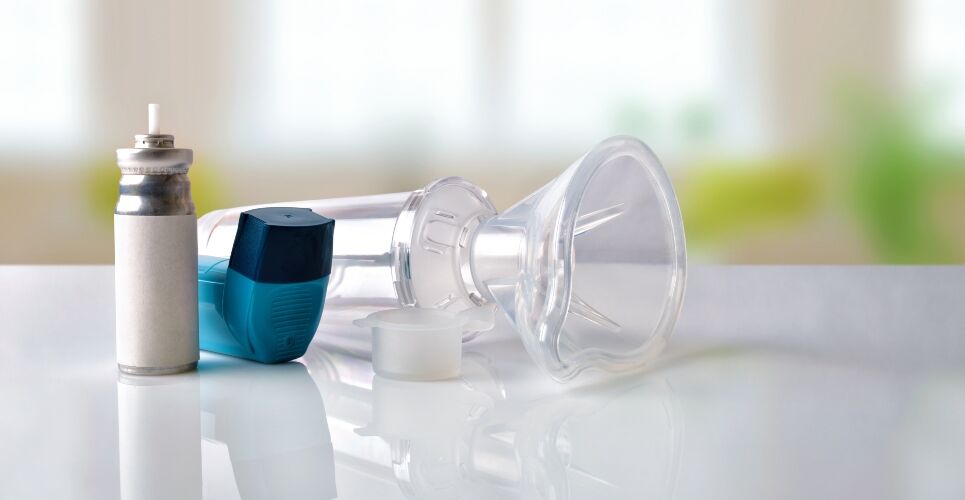Poorly controlled asthma significantly contributes to greenhouse gas (GHG) emissions, with these patients contributing eight times more excess GHG than those with well-managed asthma, new research has found.
In a first-of-its-kind study, the researchers also found that patients with poorly controlled asthma produce the same quantity of GHG as 124,000 homes each year in the UK.
The researchers – a consortium from the NHS, UK and international universities and AstraZeneca – say that 90% of the excess GHG emissions from asthma care in the UK are the result of inappropriate use of short-acting β2-agonist (SABA) reliever inhalers.
Published in the BMJ journal Thorax, the findings highlight how the improvement of care of people with asthma could substantially reduce carbon emissions and help the NHS meet its net zero targets.
The NHS aims to reduce its carbon footprint by over 80% over the next 15 years and reach net zero by 2045, and better management of asthma could help achieve this goal.
This retrospective cohort study, based on the SABA use IN Asthma (SABINA) I UK study, used anonymised health records of 236,506 people with asthma from the Clinical Practice Research Datalink, collected between 2008 and 2019, to examine the environmental footprint of asthma care in the UK.
Patients were all aged 12 and over, with a validated record of a current asthma diagnosis and current asthma at 12 months prior to baseline.
GHG emissions were retrospectively analysed by measuring carbon dioxide equivalent (CO2e) for asthma-related medication use, healthcare resource utilisation and severe exacerbations during follow-up of patients with asthma for both well-controlled and poorly controlled asthma at base level.
Well-controlled asthma was categorised as fewer than three prescriptions of SABA reliever inhalers per year and no episodes where symptoms became severe.
Poorly controlled asthma included patients who needed three or more SABA prescriptions per year and experienced one or more episodes of severe symptoms, which involved either a course of oral corticosteroids and any general practice and outpatient visits within 10 days of hospitalisation or emergency department visit.
Asthma was poorly controlled in just under half (47.3%) of the patients analysed. At baseline, patients with poorly controlled asthma versus those with well-controlled asthma received a greater number of prescriptions for SABA, inhaled corticosteroid (ICS) monotherapy and ICS in conjunction with long-acting bronchodilator inhalers.
Scaled to the national level, the overall carbon footprint of asthma care in the UK was 750,540 tonnes CO2e/year, with poorly controlled asthma contributing excess GHG emissions of 303,874 tonnes CO2e/year.
GHG emissions were eight times higher on average for a person with poorly controlled asthma than those with well-controlled asthma.
One outcome of inadequate asthma control is the increased use of SABA reliever therapy. The analysis shows that 90% of the excess GHG emissions resulted from inappropriate SABA use in patients with poorly managed asthma.
Due to worsening symptoms, the remaining excess emissions resulted from healthcare utilisation, such as GP or hospital visits.
Although SABAs provide immediate bronchodilation, they lack anti-inflammatory activity and contribute minimally to achieving asthma control. In addition, SABA prescriptions of more than three canisters per year are associated with an increased risk of exacerbations, asthma-related mortality and increased use of healthcare resources.
The researchers stated: ‘Our study indicates that poorly controlled asthma contributes to a large proportion of asthma-care related greenhouse gas emissions with inappropriate SABA use emerging as the single largest contributor.’
The Global Initiative for Asthma no longer recommends SABA inhalers are used alone as the preferred reliever for acute asthma symptoms.
The researchers concluded that efforts to implement evidence-based treatment recommendations for asthma patients and curtail inappropriate SABA use could result in substantial carbon savings for the NHS.
In November 2023, it was announced that a low-carbon salbutamol metered-dose inhaler that could reduce greenhouse gas emissions from inhaler use by around 90% was advancing to phase 3 trials in the first half of 2024.

